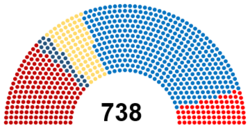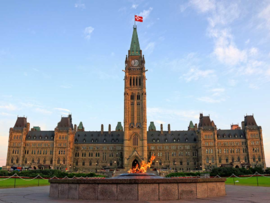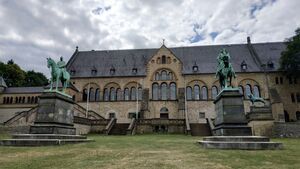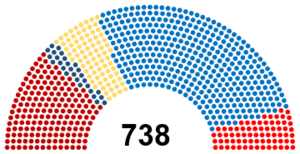Reichstag of the Frankish Empire
| Reichstag | |
 | |
| Type | |
|---|---|
| Type | |
| History | |
| Founded | 22.VI.1672 |
| Structure | |
| Seats |
738  |
Political groups |
Government (385) Opposition (353) |
| Elections | |
Voting system |
Members elected in a first-past-the-post system. |
Last election |
1682 |
Next election |
1684 |
| Meeting place | |
Reichstagsgebäude, Brandenburg | |

The Reichstag is the parliament of the Frankish Empire. Every two Norton years, one third of the seats are elected. The term Reichstag is a combination of “Reich” (empire) and “tag” (meeting, compare with days) and can be translated as "Empire meeting".
The Reichstag was founded at the proclamation of the Kingdom of Amokolia in 1672 AN. During one of the first meetings Arkadius Frederik Gustavus des Vinandy was invited to the throne. The first elections followed in 1674 AN, but after the Wende, during which the Frankish Empire was formed, the tasks and powers were laid down in the new constitution, the Constitutionem Vadum Francorum.
History
The current Reichstag is a continuation of the Amokolian Saenate. The Saenate consisted of 250 seats. At the start of the Third Kingdom of Amokolia, the Reichstag was created with 100 seats. The first elections of the revived Amokolia were in 1674 AN.

On 18.IX.1678 a special session was held in the Kaiserpalts in Frankfurt-am-Oder to adopt the new constitution, the "Constitutionem Vadum Francorum" (Common Tongue: Constitution of Francia; Germanian: Frankfurter Reichsverfassung), for the foundation of the Frankish Empire. A ratio has been established between the number of inhabitants of Francia and the number of seats. This ratio is 75,000 citizens per seat, but due to the addition of 67 million inhabitants after the connection of Gascogne, Los Bananos and Ravaria, this was adjusted. The constitution was amended, making the ratio 100,000 citizens per seat. In addition, citizens from the autonomous regions were not counted, because these autonomous regions have their own parliaments and fall outside the jurisdiction of the Reichstag.
| 1674 | 1678 | 1682 | |
|---|---|---|---|
| Reichstag seats | 100 | 455 | 738 |
Due to the rapid increase in seats in the Reichstag, only the new seats were elected in 1678 and also in these elections. The existing seats were maintained, after 1682 AN they were made eligible for election.
Tasks
Legislation
Although the constitution is very brief about the exact tasks, powers are granted by the Kaiser to the Reichstag. Together with what the constitution assigns, it boils down to the following powers and tasks:
The Reichstag may introduce bills, as may the Kaiser and the government. A bill needs the support of at least five percent of its members in order to be dealt with. A bill originating from the Kaiser will be dealt with without fail. In principle, a simple majority is sufficient, except for amendments to the constitution which must be supported by a two-thirds majority. The Kaiser signs a bill approved by the Reichstag. However, the Kaiser can also veto the bill, which means that the Reichstag has to vote with a two-thirds majority on the same bill. If the Reichstag still approves the bill, the Regent can sign on behalf of the Kaiser.
The jurisdiction of the Reichstag is limited to the Gaue and Kronenländer. The autonomous regions and Generalitätslande therefore fall outside that jurisdiction, which means that the inhabitants of those areas of the Frankish Empire are not included in the number of seats.
The Kaiser is entitled to conclude treaties with foreign countries. The Reichstag can veto, this requires a two-thirds majority.
Proposal chancellor
The Reichstag has been given the power to propose the Chancellor (Germanian: Kanzler). This is usually the leader of the largest group in the Reichstag. Since the revival of the Kingdom of Amokolia and then the Wende to the Frankish Empire, there has only been one Chancellor. Augustin Prager, sitting chancellor, is the leader for the union fraction of the Konservative Historische Partei and the Parti populaire de Gascogne.
Organisation
Members and fractions
A member of the Reichstag has a free mandate, i.e. he or she is not bound by orders. In practice, most members end up in the Reichstag because their political party has obtained sufficient votes. That is why these members are referred to as party mandates. In principle, each party forms a fraction in the Reichstag. However, the Konservative Historische Partei and the Parti populaire de Gascogne (Common Tongue: Gasconse People's Party; Germanian: Gasconse Volkspartei) have a unique collaboration. These parties form a joint fraction in the Reichstag (Germanian: Unionsfraktion).
President

The President of the Reichstag (Germanian: Reichstagspräsident) and his deputies together form the Reichstag Presidium. The four largest groups are entitled to provide an alternate. The president is elected by the members of the Reichstag; it is customary for the president not to be supplied by the governing party or parties. The president represents Parliament and is the head of the Reichstag's organisation. This organisation includes all the duties needed for the Reichstag to function, such as clerks and servants.
Overview of presidents of the Reichstag:
| Term | Name | Party |
|---|---|---|
| 1684-current | Katharina Ehlers | FPP |
| 1678-1684 | Viktor Schwartzman | AFF |
| 1672-1678 | Henry Hirsh | AFF |
| 1672 | Erik Thorne | - |
Seat distribution
The party landscape was dominated by two parties: Amokolische Freiheitsfront (Common Tongue: Amokolian Freedom Front) and the Konservative Historische Partei (Common Tongue: Conservative Historical Party). The connection of Gascogne and Los Bananos (the Kingdom of Ravaria as an autonomous region is not counted) gave a new dimension to the party landscape.
 | ||||||||||||||
| Name | Abbr. | Leader | Ideology | Political position | AM's | |||||||||
|---|---|---|---|---|---|---|---|---|---|---|---|---|---|---|
| Amokolische Freiheitsfront Amokolian Freedom Front |
AFF | Henry Hirsh | Socialism | Left wing |
173 / 738 | |||||||||
| Elwynnische Einheitspartei Elwynn Unionparty |
EPP | Halaema Keystina | Nationalism | Centre |
28 / 738 | |||||||||
| Fränkische Patriotische Partei Frankish Patriot Party |
FPP | Theodulf Backer | National Conservatism | Right wing |
81 / 738 | |||||||||
| Parti social-démocrate Social Democratic Party |
PSD | Amélie Leroux | Socialism | Left wing |
71 / 738 | |||||||||
| Unionsfraktion Unionsfraktion der Konservative Historische Partei und der Parti populaire de Gascogne Union fraction of the Conservative Historical Party and Gascon People's Party |
KHP-PPG | Augustin Prager | Conservatism | Right |
385 / 738 | |||||||||
Elections
Overview of the elections for the Reichstag: